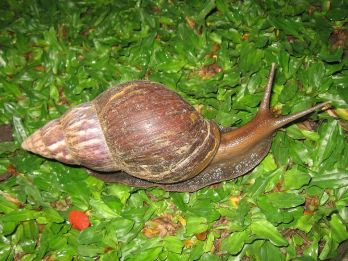Giant African snail
Lissachatina fulica, also known as Achatina fulicais, is a large snail that belongs in the family Achatinidae.
Background
The giant African snail is considered a significant threat, listed as one of the top 100 invasive species in the world. Internationally, it is the most frequently occurring pest snail.
Outside of its native range, the giant African snail thrives in many types of habitats with mild climates.
This species is a known hitchhiker pest, often carried on imported goods, shipping containers and crates, machinery and motor vehicles. They could also be introduced to Australia at the egg stage, in soil or on plant material.
Impacts
The giant African snail feeds voraciously and is a vector for plant pathogens. It therefore:
- causes severe damage to agricultural crops and native plants
- competes with native snail taxa
- is a nuisance pest of urban areas
- spreads human disease.
Giant African snails are a serious risk to Australia’s horticultural industries, capable of destroying vegetable crops, fruit trees and Australia’s native eucalypt forests.
They feed on more than 500 species of plants, including legume crops, ornamental plants, vegetables and the bark of large trees, such as citrus and pawpaw.
Identification
Adult snails are large with a long, narrow, cone-shaped shell. The shell is usually 50 to 100 millimetres long but can reach up to 200 millimetres.
They can vary in colour but are usually light brown, with alternating brown and cream bands on their upper whorls.
All adult snails have both male and female sexual organs. In a typical year, every mated adult lays about 1200 eggs.
Eggs are 4.5 to 5.5 millimetres in diameter and range from cream to yellow in colour. They are oval shaped and each batch can have between 100 and 400 eggs.


